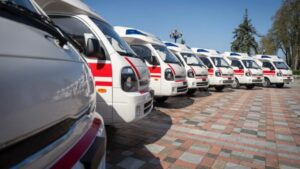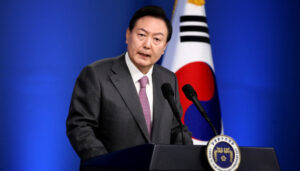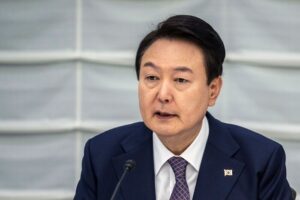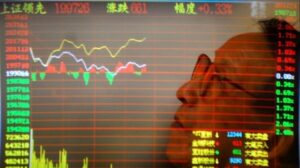
Ukraine has received the last 20 out of 200 KIA BONGO ambulances as part of a humanitarian donation from the Government of the Republic of Korea.
According to the Ministry of Health, the total cost of all the vehicles donated in cooperation between the Korean Embassy in Ukraine and the Ministry of Health is over $12 million.
The donated vehicles are fully equipped with modern medical equipment necessary to save patients’ lives at the scene and during transportation to medical facilities. Each vehicle is equipped with defibrillator monitors, oxygen supply systems, trauma equipment, stretchers and emergency medicines.
The Ministry of Health emphasizes that since the beginning of the war, the enemy has destroyed or damaged more than 600 ambulances in Ukraine.
In total, thanks to the support of international partners, Ukraine has already received more than 1,500 ambulances, 73 of which are armored.
The renewal of the ambulance fleet began in 2020-2021, even before the full-scale invasion: 895 ambulances were purchased at the expense of the state budget. They ensured the stable operation of the system in the first difficult months of the war.
The Ministry of Health reminds that Ukrainian medical institutions have recently received 100 modern ultrasound diagnostic systems and 30 mobile X-ray fluoroscopic systems from the Government of the Republic of Korea as part of humanitarian aid.

South Koreans remain widely opposed to directly supplying arms to Ukraine, recent polls show, despite renewed international requests from Kyiv and allied capitals after North Korean troops were reported to be helping Russia.
Ukraine has asked Seoul for a range of weapons and Seoul has said it could consider such aid, depending on future steps by Russia and North Korea.
A Ukrainian delegation led by Defence Minister Rustem Umerov met South Korean President Yoon Suk Yeol on Wednesday, Yoon’s office said, amid media reports that the visit aimed to seek arms support.
“No to the South Korean government planning arms supply to Ukraine,” read a banner held by a small group of protesters gathered outside Yoon’s office in the capital.
Both sides agreed to keep up sharing of information on North Korea’s dispatch of troops to Russia as well as the exchange of technology and weapons between the two, Yoon’s office said in a statement.
The delegation also met Seoul’s national security advisor Shin Won-sik and defence minister Kim Yong-hyun and discussed cooperation between Seoul and Kyiv.
Ukraine planned to send Seoul a detailed request for arms support including artillery and an air defence system, President Volodymyr Zelenskiy said in an October interview with South Korean broadcaster KBS.
A Western diplomat told Reuters that discussions behind the scenes focused on air defence systems designed to shoot down aircraft and missiles, but this month’s U.S. presidential election win by Donald Trump cast uncertainty over the talks.
Yoon, already battling with record low approval ratings over domestic scandals, faces wide opposition from the South Korean public to the idea of arming Ukraine, surveys have shown.
Most South Koreans viewed growing military ties between Pyongyang and Moscow as a threat, a Gallup Korea poll showed in October, but 82% opposed sending military aid, including arms.
“To the South Korean government, there will be fewer benefits for continuing to support (military aid) when there is little domestic support and the relationship with the next U.S government could deteriorate,” said Yang Uk, an analyst at the Asan Institute for Policy Studies.
Yoon’s low approval ratings, along with little public backing for supply of weapons, are burdens sapping his mandate on foreign policy, he added.
The public, largely not sensitive to the seriousness of the war in Ukraine, is likely to focus on the downside in the event of the South’s direct involvement, Yang said.
Unlike neighbouring Japan, which has also avoided directly arming Kyiv, South Korea is one of the world’s largest weapons exporters and has inked large, lucrative defence deals with Ukraine’s neighbours.
South Korea has provided demining vehicles, body armour, and other non-lethal aid for Ukraine and has not ruled out supply of weapons to Kyiv, especially after Seoul and Washington reported the dispatch of thousands of North Korean troops to Russia.
At home, the main opposition Democratic Party (DP) has criticised the government for not ruling out provision of weapons aid and urged it to seek parliamentary approval for such decisions.
The DP has a majority in parliament after a landslide victory in an April election, but experts say the president can bypass the body to supply lethal weapons to another country.
In an interview with Russia’s TASS news agency, Russian Deputy Foreign Minister Andrey Rudenko said ties between Seoul and Moscow would be “completely destroyed” if South Korea supplied arms to Ukraine.
Russia should first ask itself what it provides to North Korea in exchange for Pyongyang’s dispatch of troops and how it is threatening the security of South Korea, a senior South Korean foreign ministry official told a background briefing on Wednesday, when asked about the comments.
Seoul’s response depends on the actions of Russia and North Korea, the official added, speaking on condition of anonymity.
https://www.reuters.com/world/south-koreans-remain-opposed-sending-arms-ukraine-2024-11-27/

South Korean President Yoon Seok-yol has arrived in Ukraine on an unannounced visit, South Korea’s Ryonhap news agency reported.
“Yoon and first lady Kim Kyung-hee arrived in Ukraine from Poland,” the agency quoted the president’s senior press secretary Kim Eun-hye as saying Saturday.
Yoon reportedly visited the site of mass killings in Bucha near Kiev and then visited Irpin.
According to the news agency, the South Korean president “plans to lay a wreath at a war memorial before holding a meeting with Ukrainian President Volodymyr Zelensky.”
The visit comes at the end of a two-stage trip of the South Korean president, during which he visited Lithuania at the North Atlantic Treaty Organization summit and then Poland on an official visit.

Stock indices in Japan and South Korea are rising on Monday while the Chinese indicator is sinking.
Australian and Hong Kong markets are closed due to the Easter holiday.
Japan’s Nikkei 225 stock index is up 0.4% in trading thanks to data on rising consumer confidence in the country.
Japan’s Consumer Confidence Index in March rose to a maximum of 33.9 points from 31.1 points a month earlier in May last year, according to official statistical data. The consensus forecast of experts quoted by Trading Economics had expected the index to rise to 31.9 points.
Indicators of personal income growth, employment, general standard of living and consumers’ willingness to buy durable goods rose in March.
Shares of Fast Retailing, owner of the Uniqlo brand, gained 1.6 percent in trading. Nintendo rose 3.8%, Sony gained 0.4% and Toyota Motor gained 0.2%.
Among the leaders of growth in Japan on Monday are shares of shipping companies. Nippon Yusen shares gained 3.2%, Mitsui OSK Lines gained 2.1% and Kawasaki Kisen Kaisha gained 1.9%.
The share price of Japan Display Inc. soared 21%. The Japanese company said Monday it has signed a memorandum of understanding with China’s HKC Corp. to form a strategic alliance to develop operations in OLED technology.
Japan Display and HKC plan to jointly build facilities to produce next-generation OLED displays and intend to launch mass production in 2025.
South Korea’s KOSPI stock index is adding 0.9 percent in trading.
Shares of Samsung Electronics rose 1.1% despite the weak preliminary report of the South Korean maker of smartphones and semiconductor components for the first quarter.
The company’s January-March operating profit fell 20 times in the quarter, according to preliminary data released after the market closed Friday.
Samsung also said Friday that it intends to “significantly” cut production of certain types of memory chips to streamline manufacturing operations.
South Korea’s government said late last week that it would direct 7 trillion won ($5.32 billion) over the next five years to financially support local battery manufacturers planning to build facilities in North America.
LG Electronics Inc. shares, which also released preliminary earnings Friday, are down 1.1%. The company reported a 23% decline in operating profit in the first quarter.
Shares of LG Energy Solution Ltd. rose 2.6%. The battery maker, according to preliminary estimates, increased operating profit nearly 2.5 times in the first quarter, beating experts’ expectations.
China’s Shanghai Composite stock index is losing 0.2%. Traders are worried about another round of tensions in U.S.-China relations after a meeting in the U.S. between current U.S. House Speaker Kevin McCarthy and Taiwanese Chief of Staff Tsai Ing-wen.
The Chinese army began massive military exercises around Taiwan on April 8, which an army spokesman said were “a warning to separatist forces advocating Taiwanese independence and a necessary measure to protect China’s sovereignty and territorial integrity.”
Shares of Chinese anti-virus developer 360 Security Technology lost 10% in trading, electronics maker Changsha Jingjia Microelectronics Co. – 14%, and alcohol producer Wuliangye Yibin 2.7%.